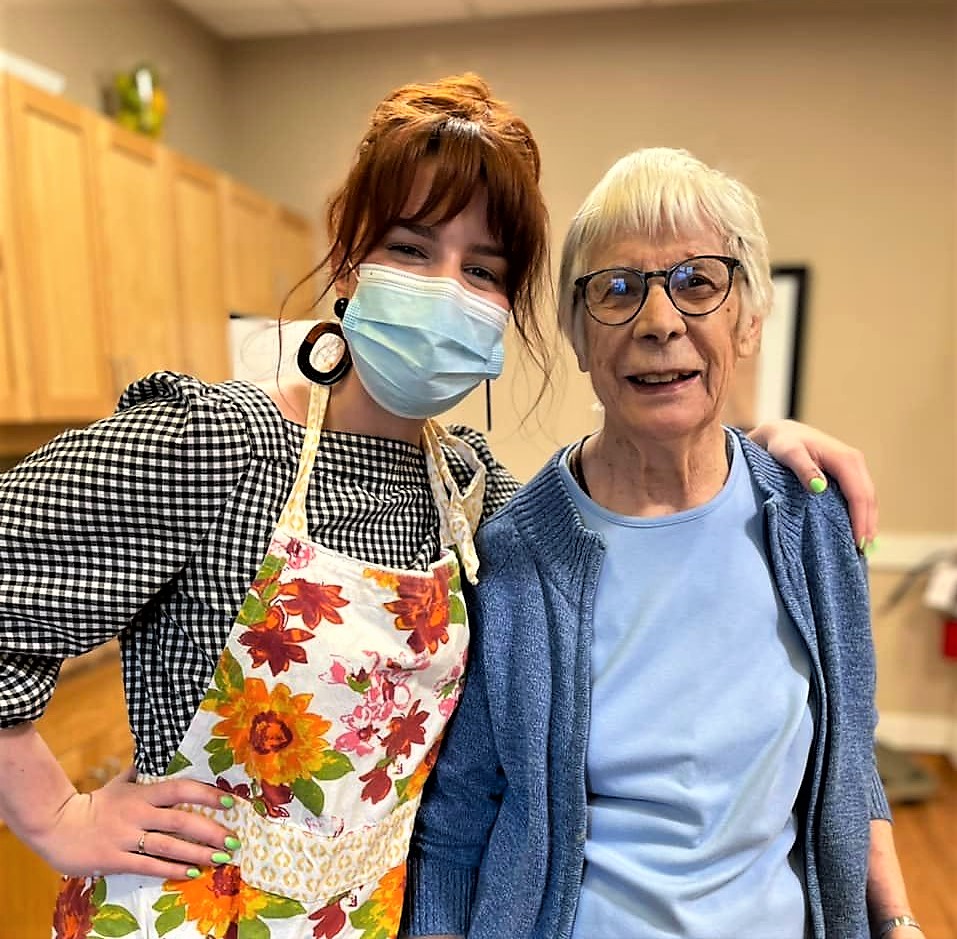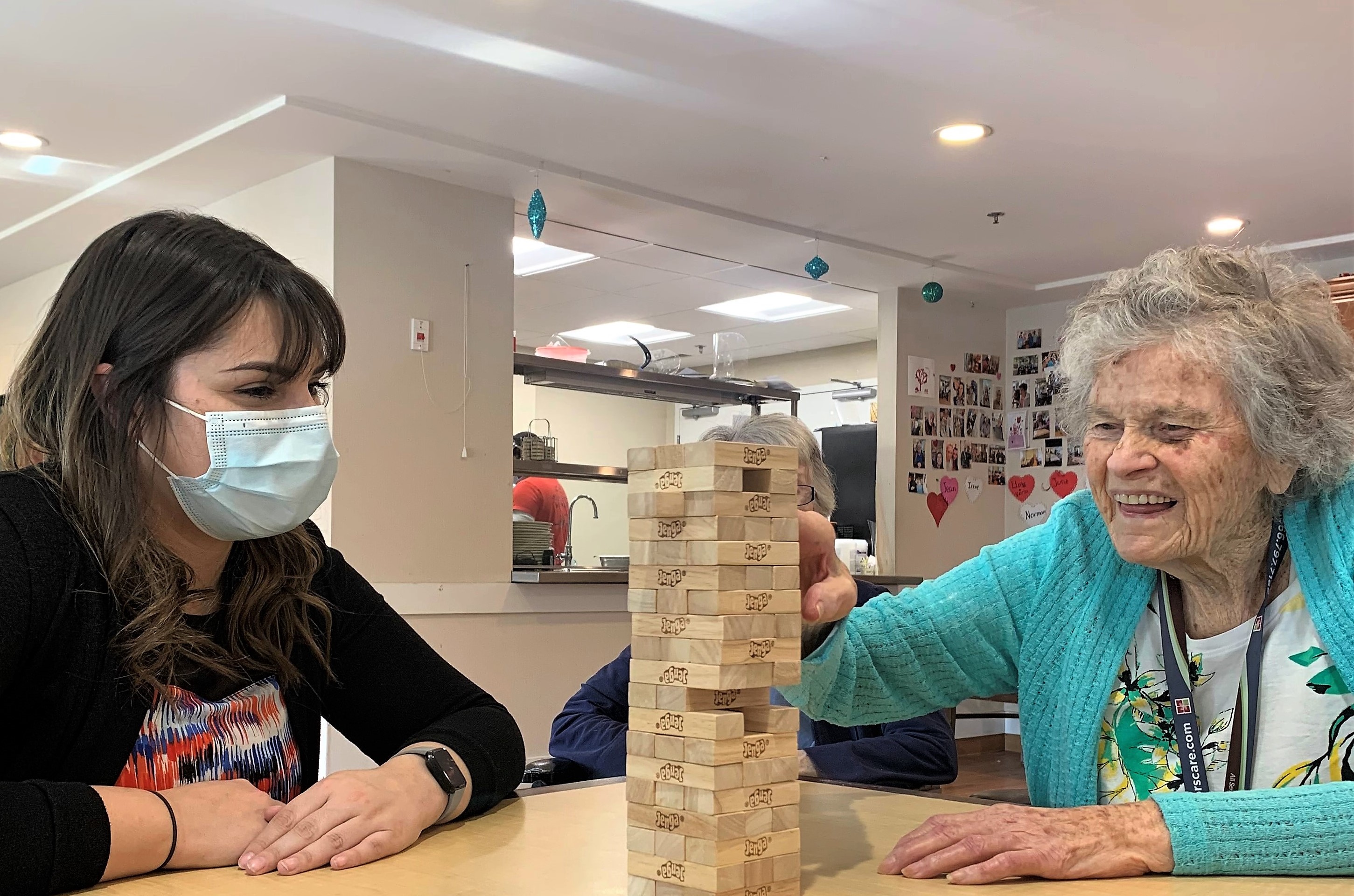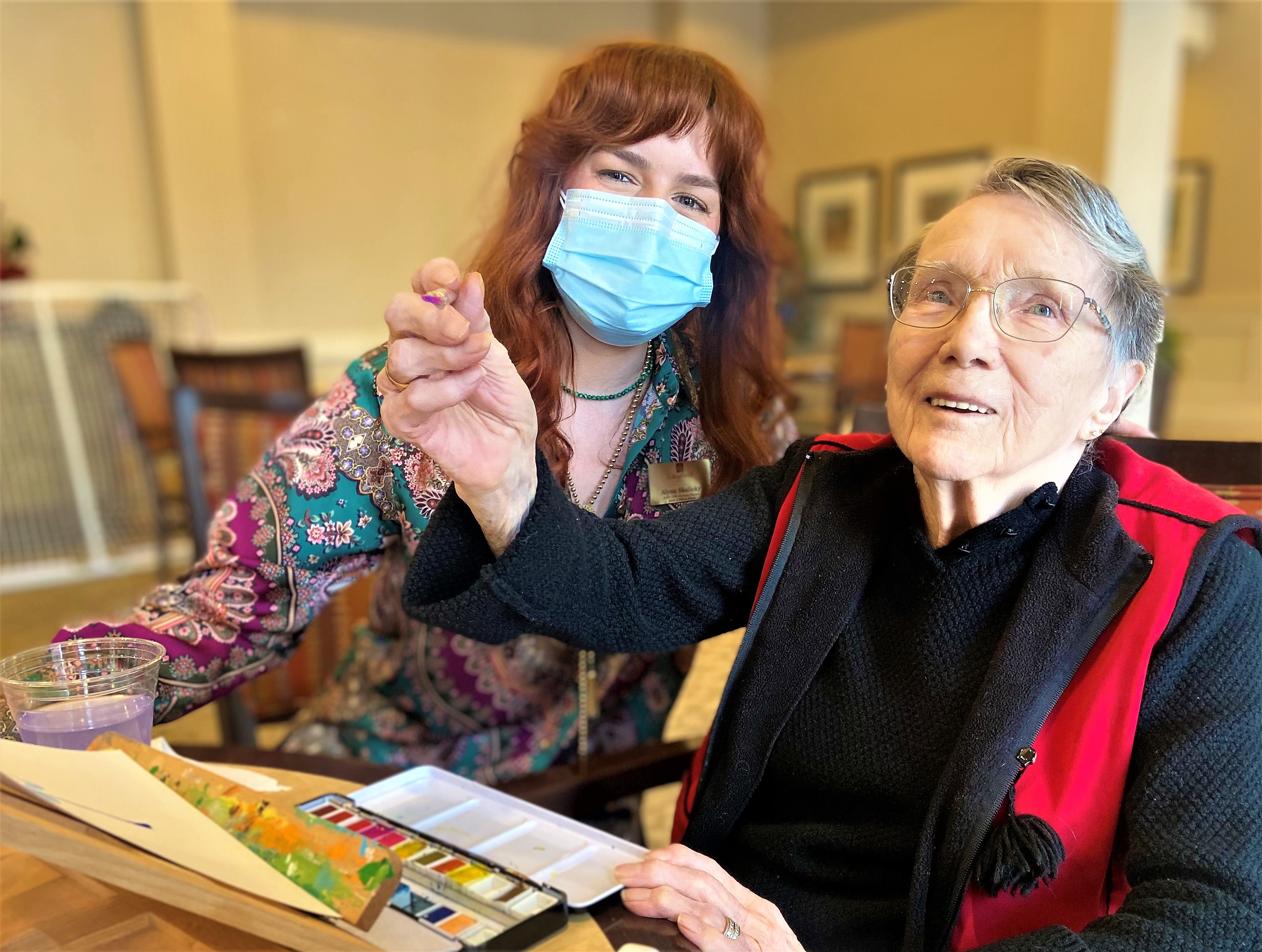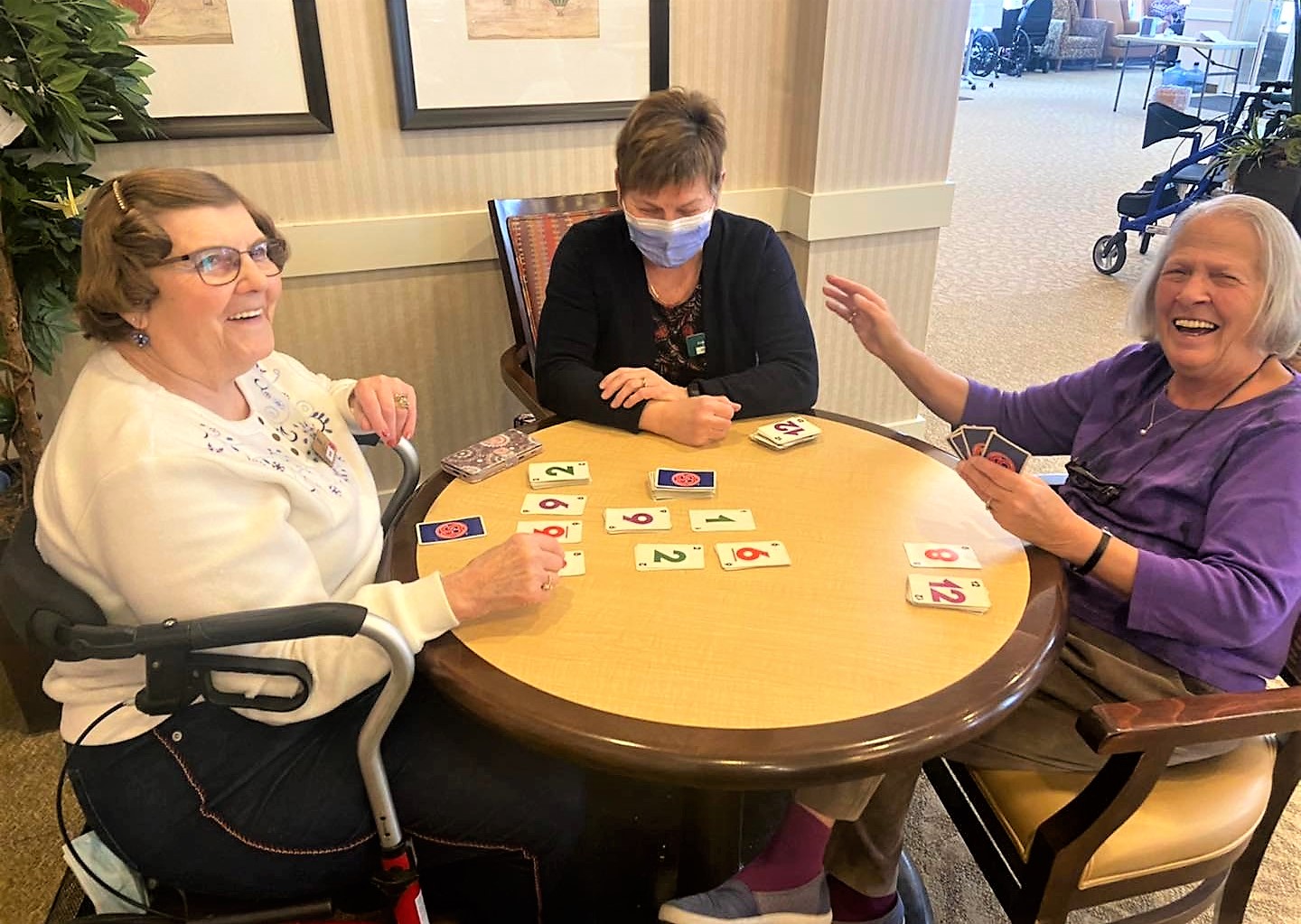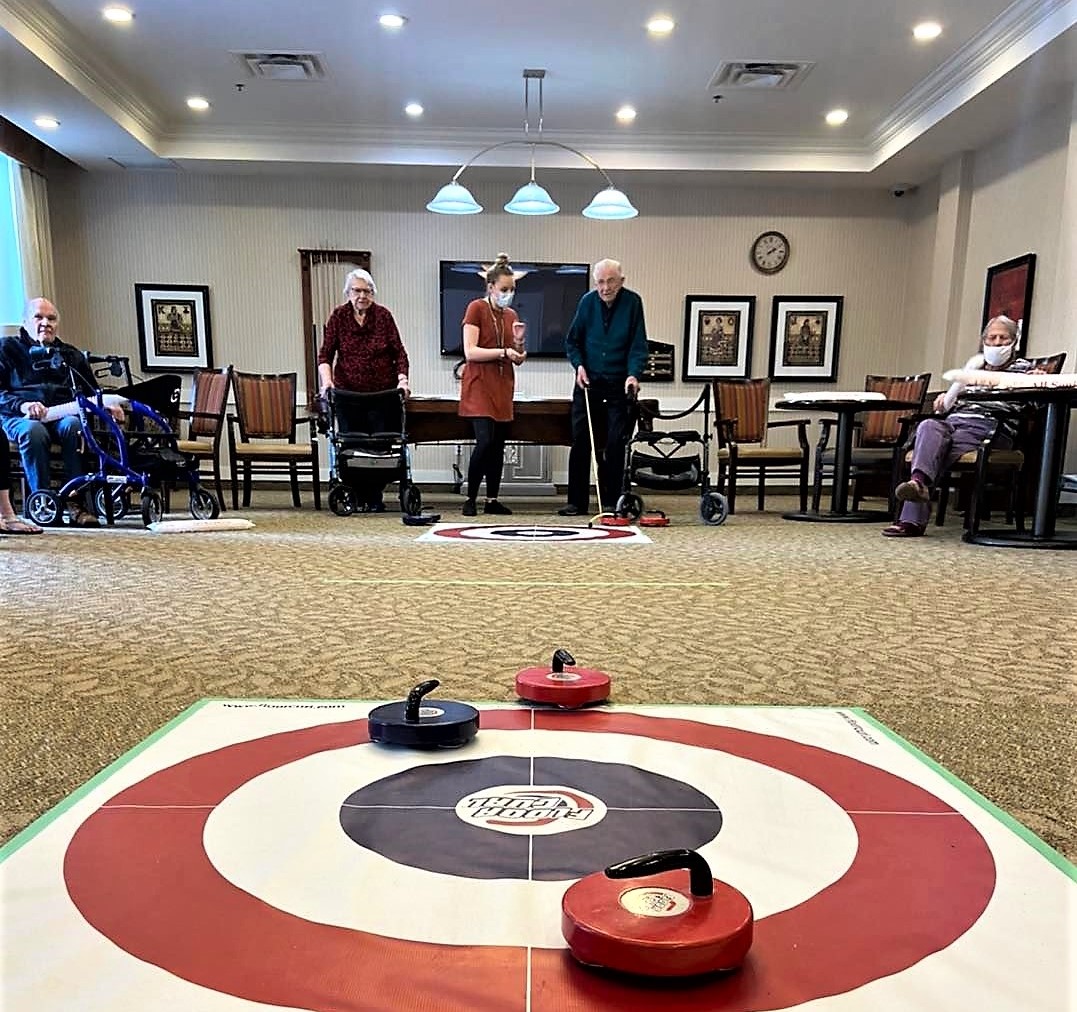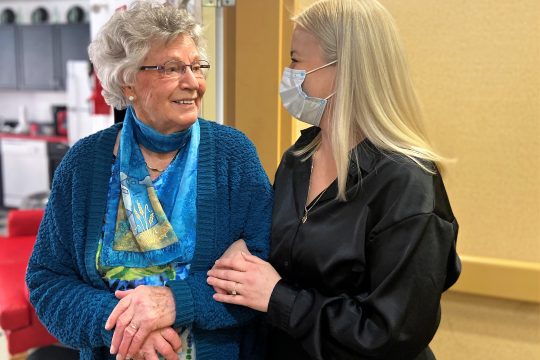
A woman who loves to see a plan come together, Alynn Skalicky leads a close-knit team of elite recreation professionals known the A-Team.
The Senior Director of Recreation Therapy for Regina, Alynn is a fierce proponent of her profession. “I always knew that I wanted to work with seniors,” she says. “I love their history and stories. Recreation was the perfect fit.”
Working as a recreation therapist often means connecting with others using games and puzzles in a way that can be very rewarding, and emotional. Recreation therapists are serious about fun. More than just passing time, the fun at College Park I and II in Regina, SK has a purpose: to enhance well-being.
And according to a College Park resident, “They give you a reason to get up and going.”
Joined by Samantha Frey (CP2 care floor) and Shalynne Dodd (CP1), the 3 Recreation Therapists make up the A-Team (Activities Team). But what sets them apart?
How The A-Team Enhances Senior Well-Being
“We’re all very personable and empathetic,” says Shalynne. “Both of these ladies are the best people I know. They have big hearts and go above and beyond to do what they need for the residents.”
For Alynn, what makes the team stand out is that they all hold the professional designation of Certified Therapeutic Recreation Specialist® or CTRS.
“It means that we are accountable – to our profession and to our clients, the residents,” explains Alynn. “We are educated in doing therapeutic interventions. It’s more than just activities and bingo. It’s about knowing what works for your residents and is meaningful, rather than just one size fits all.”
To accomplish that goal in a residence the size of College Park, the team takes the time to get to know each resident and provide what they need through a slyly stringent assessment process.
Soon after an older adults arrive at the residence, they meet with the therapists. In what looks to the casual observer like a simple conversation, the therapist takes them through a series of validated assessments. They look at all areas of functioning: their personal leisure profile (past and present interests), their strengths, social history, goals, and areas of need. These are then put together to make program – or activity – referrals.
How Recreation Therapy Supports Seniors
Samantha Frey loves working with seniors and is gifted in her ability to form therapeutic connections with seniors experiencing cognitive decline.
While she offers a variety of popular exercise programs like Aquafit, Drumfit, T’ai Chi, and Forever in Motion (for balance and resistance), it is her brain fit programs and approach to care that really sets her apart.
A Fit Minds Certified Cognitive Coach, Samantha facilitates a daily neurobics group . “The residents just brighten up during the Fit Minds program,” she says. The group is individualized to the needs of each resident and hit on different types of thinking – critical, computation, language skills.
“Residents will help each other out in areas where they are strong, but others aren’t,” she explains. “It’s amazing to see all the connections being made – relationship are being built along with the cognitive building!”
In the afternoons, Samantha can be found spending one-on-one time with residents who need more support or who use the sensory room. “They love the sensory room on the care floor! It’s especially helpful for the responsive behaviours we sometimes see with dementia.”
Play with a Purpose
Some of College Park residents’ favorite activities include music, socializing, scenic outings, worship services, pet visits, and movie nights. Sounds fun, right?
It’s more than just fun. Activities such as board games and bocce help improve hand-eye coordination, fine-motor skills, and gross-motor movement. Perhaps the greatest benefit of recreational therapy, though, is that it focuses on people’s strengths, regardless of their age or limitations. Here are just some of the ways that these programs can help seniors.
1. Enhances Physical Health
A College Park resident sums it up, “The rec dept, I believe, has helped me so much. Before I arrived here, I could not even walk properly & my knees were so sore and aching. I have learned so many things about how you should be exercising on a regular basis.”
Studies link recreational therapy to increased activity and alertness, fewer falls, and less use of medication. And exercise programs, especially among frail adults, can lead to greater cardiovascular fitness, lower blood pressure and increased flexibility, strength, and ambulatory skills.
All activities can be customized to increase:
- Balance
- Mobility
- Agility
“We’re very active around here! At College Park I, all our fitness and exercise programs are very popular,” says Shalynne. “When people come to a new program, they realise how able bodied they still are. They’re proud of themselves afterwards. It sparks a joy for moving the body again and they feel so much better physically.”
2. Builds Social Connections
Group activities help seniors feel like they’re a part of their community. Bingo, for example, isn’t just about winning a prize! It encourages seniors to chat with one another and make new friends, recognize patterns, and maintain attention. Group activities can:
- build connections with the community through a fun activity
- development or maintain social skills
- help develop self-advocacy
- give seniors something to look forward to during times of transition.
3. Boosts Cognitive Function
Minds are kept fit and active by skillfully chosen exercises. A recreation therapist can work with seniors to maintain or restore cognitive functioning, help increase alertness, enhance problem-solving skills, and keep the brain stimulated.
One study, for example, showed that individuals with cognitive decline involved in therapeutic recreation had fewer days in which they exhibited dementia-related behaviors. Therapeutic recreation resulted in greater engagement and more displays of positive moods.
Some of the therapeutic recreation activities – like those provided through our BLOSSOM programs – that enhance cognitive function include:
- Trivia games
- Painting
- Playing a musical instrument or singing
4. Increases Positive Emotions
When the A-Team engages with someone, their mood is almost always improved.
Therapeutic recreation activities boost mood and emotional health by reducing stress and providing an outlet. When they engage in meaningful activities, older adults rediscover sense of purpose in life.
For seniors who need an extra boost or who are more isolated, the A-Team have got you covered! “I spend extra time getting to know them,” Shalynne says. “It’s very rewarding to see how much the seniors appreciate the one-on-one time; having someone sit down and listen to them, ask about them, and have a fluid conversation.”
Supervising Students Keeps Ideas Flowing
As a part of their professional practice, the A-Team supervises students completing the 560 hours of internship required as a part of CTRS accreditation. “Having students come in all the time means we don’t get stagnant – they always bring new ideas!” says Alynn.
“We also go to the University of Regina to speak with students about the benefits of working in the private sector with seniors. It’s a good way to advocate for the profession and share the knowledge with other people. Not to mention let them know about ASC’s amazing scholarship program! “
There is Always Something To Do at All Seniors Care
At College Park residences – as with every All Seniors Care residence – the activity calendars are full! Every day has a selection of groups like armchair travel, mind joggers (a mindfulness group), exercise programs, and social get-togethers. Specialized programs like the grief support group are also popular with independent residents.
Individualized and group programs like those at College Park are available at all ASC locations. If you’re looking for retirement homes in Ottawa, be sure to schedule a tour to see what is happening with our Beacon Heights A-Team and the exciting new chef.
Contact us today to discuss how the A-Team in your province can help you or your loved ones!
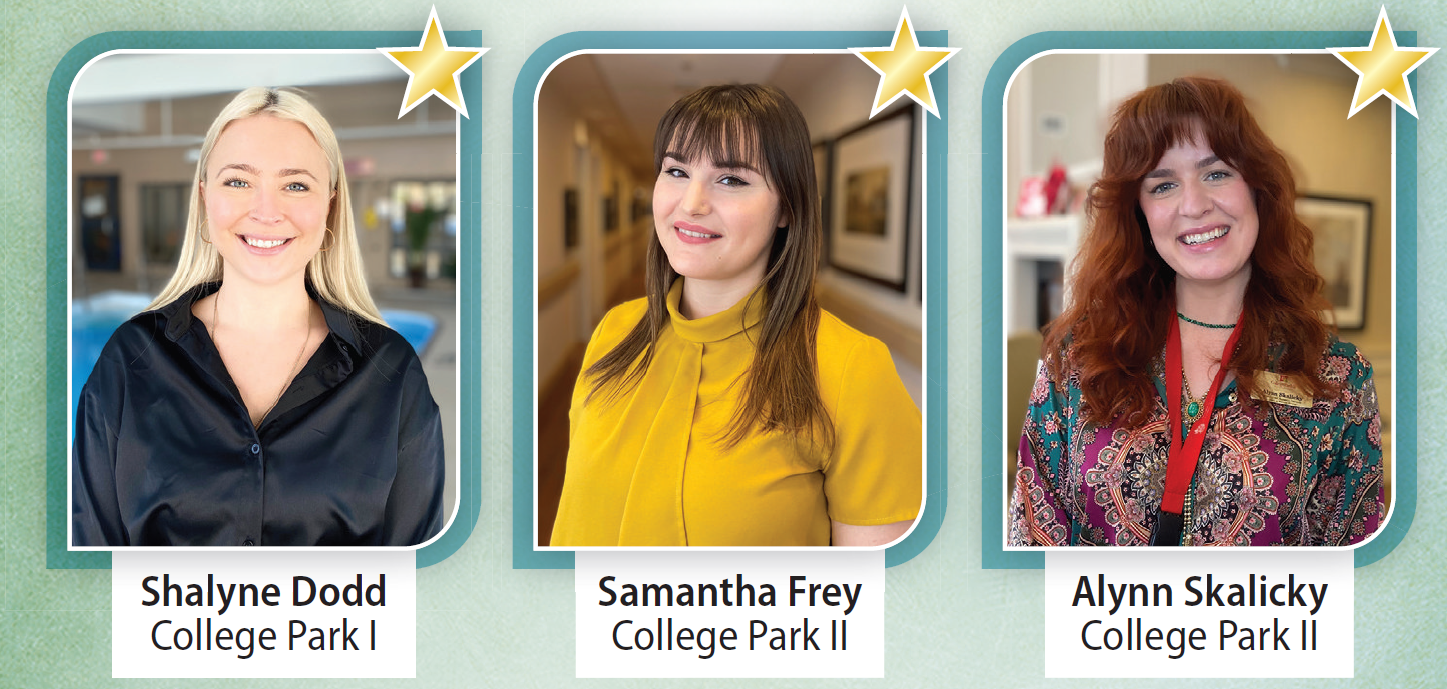
Writer – Julianna McLeod
Julianna is a health and wellness expert at All Seniors Care. Her mission is to create content that empowers seniors to form sustainable solutions for lasting health and happiness. She is an experienced writer, editor, and Recreational Therapist living in Toronto.
